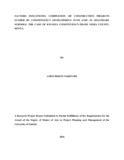| dc.description.abstract | CDF was established through the Constituency Development Fund Act, 2003 and amended in 2007 with the goal of fighting poverty at the grassroot level. All the constituencies in the Republic of Kenya have been receiving funds meant to establish and improve existing public utilities such as classrooms, dispensaries, roads, and dormitories, open air markets especially since 2007. However in Kwanza constituency, some projects stalled along the way or even before commencement, mostly called white elephant projects. As a result, some remain unutilized especially due to non-completion or partial completion. It is in this perspective that this study investigated the factors influencing timely completion of CDF construction projects in schools in Kwanza constituency. The research objectives were to examine the extent to which economic risks influence timely completion of CDF funded construction projects in secondary schools in Kwanza Constituency, to assess the extent to which community participation influences timely completion of CDF funded construction projects in secondary schools in Kwanza Constituency, to establish how availability of funds influences timely completion of CDF funded construction projects in secondary schools in Kwanza Constituency, to determine how technical competence of the project managers influence timely completion of CDF funded construction projects in secondary schools in Kwanza Constituency This study adopted a descriptive research design. The target population consisted of the project implementers and project beneficiaries selected from the incomplete CDF construction projects in Kwanza constituency. Purposive sampling technique was used to sample the project implementers who were the key informants in this study. The simple random technique was adopted in recruiting the project beneficiaries to participate in this study. The implementers involved the project managers, project Engineers and local representatives of the CDF projects. On the other hand, the beneficiaries involved were teachers and students in schools where the incomplete CDF projects were situated. Data was collected by use of questionnaires and interview methods from a sample of 24 implementers and 120 beneficiaries. The data collected was analyzed by both quantitative and inferential statistics. The study results were presented by the use of tables, bar graphs, and pie charts. The study established that Economic risks, Community participation, Availability of funds and Technical competence significantly influenced the timely completion of the CDF construction projects in Kwanza constituency. In this regard, community participation, availability of funds and technical competence all had a positive effect on timely completion of CDF construction projects while Economic risk alone had a negative effect. Apart from concluding that the four factors had an effect on timely completion of the CDF construction projects, the study also noted that Government procedures for disbursement of funds are bureaucratic, and thus most CDF projects once approved by BOM await a longer period before actual release of funds. The study made recommendations that the Government of Kenya should ensure that the largest proportion of the CDF funds are allocated to development projects such as schools, roads, and health facilities. The government through the concerned Ministry and Departments like CDF should consider the procedure/ process for remitting funds for school construction projects while members of the public should be involved in identifying development projects that ought to be funded using the CDF kitty at the constituency level. Publicity should be given to CDF project processes, structure of CDF revised to make it more inclusive by clearly stating the position and role of the general public, regulatory guidelines concerning financial literacy in CDF committees as well as other stakeholders put in place, CDF implementers at the constituency level be trained and the CDF Committees cleared of any vested political interests in CDF project | en_US |

